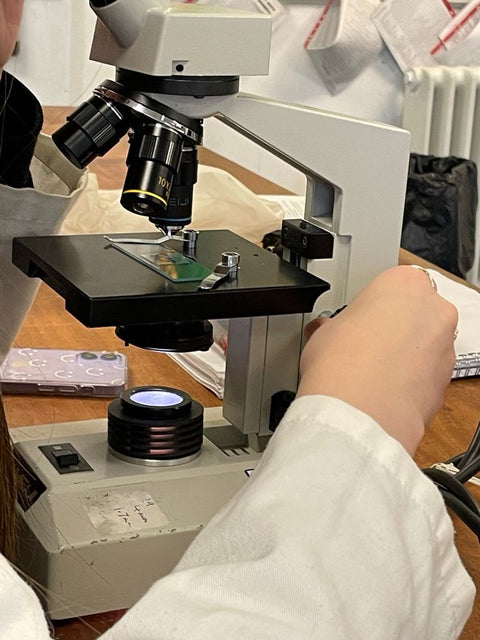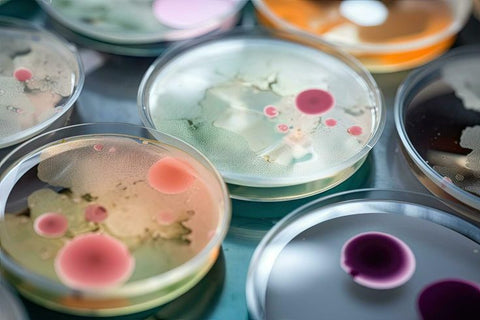The Science
Bacteria have a reputation for causing disease, so the idea of tossing down a few billion a day for your health might seem — literally and figuratively — hard to swallow. But a growing body of scientific evidence suggests that you can treat and even prevent some illnesses with foods and supplements containing certain kinds of live bacteria.
Commonly referred to as microflora, good and bad bacteria need to be balanced for optimal health. Good bacteria, the kinds found in probiotic supplements and fermented foods, help synthesise key nutrients, help the body digest fibre, support immune function by stimulating it and keep bad bacteria at bay.
A host of other factors can disturb the ratio of good-to-bad bacteria – food choices, stress, poor sleep, pollution, disease, medications, antibiotics. An imbalanced gut flora is referred to as ‘dysbiosis’ and can lead to many gut-specific symptoms beyond the gut.
Probiotics are gut-dwelling bacteria that keep pathogens (harmful microorganisms) in check, aid digestion and nutrient absorption, and contribute to immune function.
It is important to make sure that the probiotic supplement can reach its site of action and the strains contained are backed by research showing a beneficial effect
Testing
Each of our ingredients has been clinically tried. Every batch is tested for contaminants and quality is controlled through manufacturing at WHO-GMP and FDA certified facility. Stability testing is conducted at the time of formulation and manufacturing
Strain selection
We like to keep it clean and simple. only high quality, vital strains. The dosages are derived through research carried out across the globe.
Licensing
We have acquired the Food Safety and Standards Authority of India (FSSAI) license in order to ensure the safety of products. Our manufacturing facility is WHO-GMP and FDA certified.
Clinical Studies
Avershina, E., Lundgård, K., Sekelja, M., Dotterud, C., Storrø, O., & Øien, T. et al. (2016). Transition from infant- to adult-like gut microbiota. Environmental Microbiology, 18(7), 2226-2236. https://doi.org/10.1111/1462-2920.13248
Bajinka, O., Tan, Y., Abdelhalim, K., Özdemir, G., & Qiu, X. (2020). Extrinsic factors influencing gut microbes, the immediate consequences and restoring eubiosis. AMB Express, 10(1). https://doi.org/10.1186/s13568-020-01066-8
Carding, S., Verbeke, K., Vipond, D., Corfe, B., & Owen, L. (2015). Dysbiosis of the gut microbiota in disease. Microbial Ecology In Health & Disease, 26(0).https://doi.org/10.3402/mehd.v26.26191
Ghoddusi, H., & Tamime, A. (2014). MICROFLORA OF THE INTESTINE | Biology of Bifidobacteria. Encyclopedia Of Food Microbiology, 639-645. https://doi.org/10.1016/b978-0-12-384730-0.00208-1
Hill, D., Sugrue, I., Tobin, C., Hill, C., Stanton, C., & Ross, R. (2018). The Lactobacillus casei Group: History and Health Related Applications. Frontiers In Microbiology, 9. https://doi.org/10.3389/fmicb.2018.02107
Hoover, D. (2014). Bifidobacterium. Encyclopedia Of Food Microbiology, 216-222. https://doi.org/10.1016/b978-0-12-384730-0.00033-1
Hosseini Nezhad, M., Hussain, M., & Britz, M. (2014). Stress Responses in ProbioticLactobacillus casei. Critical Reviews In Food Science And Nutrition, 55(6), 740-749. https://doi.org/10.1080/10408398.2012.675601
Jochum, L., & Stecher, B. (2020). Label or Concept – What Is a Pathobiont?. Trends In Microbiology, 28(10), 789-792. https://doi.org/10.1016/j.tim.2020.04.011
Kaźmierczak-Siedlecka, K., Daca, A., Folwarski, M., Witkowski, J., Bryl, E., & Makarewicz, W. (2020). The role of Lactobacillus plantarum 299v in supporting treatment of selected diseases. Central European Journal Of Immunology, 45(4), 488-493. https://doi.org/10.5114/ceji.2020.101515
María Remes-Troche, J., Coss-Adame, E., Ángel Valdovinos-Díaz, M., Gómez-Escudero, O., Eugenia Icaza-Chávez, M., & Antonio Chávez-Barrera, J. et al. (2020). Lactobacillus acidophilus LB: a useful pharmabiotic for the treatment of digestive disorders. Therapeutic Advances In Gastroenterology, 13, 175628482097120. https://doi.org/10.1177/1756284820971201
Molnar-Gabor, D., Hederos, M., Bartsch, S., & Vogel, A. (2019). Emerging Field - Synthesis of Complex Carbohydrates. Case Study on HMOs. Industrial Enzyme Applications, 179-201. https://doi.org/10.1002/9783527813780.ch2_5
Mu, Q., Tavella, V., & Luo, X. (2018). Role of Lactobacillus reuteri in Human Health and Diseases. Frontiers In Microbiology, 9. https://doi.org/10.3389/fmicb.2018.00757
Rodríguez-Sojo, M., Ruiz-Malagón, A., Rodríguez-Cabezas, M., Gálvez, J., & Rodríguez-Nogales, A. (2021). Limosilactobacillus fermentum CECT5716: Mechanisms and Therapeutic Insights. Nutrients, 13(3), 1016. https://doi.org/10.3390/nu13031016
Turroni, F., Duranti, S., Milani, C., Lugli, G., van Sinderen, D., & Ventura, M. (2019). Bifidobacterium bifidum: A Key Member of the Early Human Gut Microbiota. Microorganisms, 7(11), 544. https://doi.org/10.3390/microorganisms7110544
Wallace, C., & Milev, R. (2017). The effects of probiotics on depressive symptoms in humans: a systematic review. Annals Of General Psychiatry, 16(1). https://doi.org/10.1186/s12991-017-0138-2
Won, G., & Lee, J. (2017). Salmonella Typhimurium, the major causative agent of foodborne illness inactivated by a phage lysis system provides effective protection against lethal challenge by induction of robust cell-mediated immune responses and activation of dendritic cells. Veterinary Research, 48(1). https://doi.org/10.1186/s13567-017-0474-x
ZAMBERLIN, Š., DOLENČIĆ ŠPEHAR, I., KELAVA, N., & SAMARŽIJA, D. (2012). Probiotic bacterium Lactobacillus rhamnosus: beneficial and adverse effects on human health. https://www.researchgate.net/publication/273769199_Probiotic_bacterium_Lactobacillus_rhamnosus_Beneficial_and_a_dverse_effects_on_human_health.



